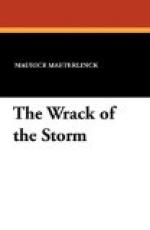2
A hundred years ago, under Napoleon, France enjoyed her spell of hegemony, which she was not able to prolong because this hegemony was more the work of a prodigious but accidental genius than the fruit of a real and intrinsic power. Next came the turn of England, who to-day possesses the greatest empire that the world has seen since the days of ancient Rome, that is to say, more than a fifth part of the habitable globe. But this vast empire rests no more than did Napoleon’s upon an incontestible force, inasmuch as up to this day it was defended only by an army less numerous and less well-equipped than that of many a smaller nation, thus almost inevitably inviting war, as Professor Cramb pointed out a year or two ago in his prophetic book, Germany and England, which has only recently aroused the interest which it deserves.
It seemed, therefore, as if between these two Powers, which were more illusory than real, pending the advent of Russia, whose hour had not yet struck; in this gap in history, between a nation on the verge of its decline, or at least seemingly incapable of defending itself, and a nation that was still too young and incapable of attack, fate offered a magnificent place to whoso cared to take it. This is what Germany felt, at first instinctively, urged by all the ill-defined forces that impel mankind, and subsequently, in these latter years, with a consciousness that became ever clearer and more persistent. She grasped the fact that her turn had come to reign over the earth, that she must take her chance and seize the opportunity that comes but once. She prepared to answer the call of fate and, supported by the mysterious aid which it lends to those whom it summons, she did answer, we must admit, in an astonishing and most formidable manner.
She was within a hair’s breadth of succeeding. A little less prolonged and less gallant resistance on the part of Belgium, a suspicious movement from Italy, a false step made upon the banks of the Marne; and we can picture Paris falling; France overrun and fighting heroically to her last gasp; Russia, not crushed, but weary of seeking victory and making terms for good or ill with a conqueror impotent to harm her; the neutral nations more or less reluctantly siding with the strongest; England isolated, giving up her colonies to staunch the wounds of her invaded isle; the fasces of justice broken asunder by a separate peace here, a separate peace there, each equally humiliating; and Germany, monstrous, ferocious, implacable, finally towering alone over the ruins of Europe.
3
Now it seems that we have turned aside the inflexible decree. It seems that we have averted the fate that was about to be accomplished. It was bearing down upon us with the weight of the ages, with all the weight of all the vague but irresistible aspirations of the past and, perhaps, the future. Thanks to the greatest effort which mankind has ever opposed to the unknown gods that rule it, we are entitled to believe that the decree has broken down and that we have driven it into the evil cave where never human force before had compelled it to hide its defeat.




